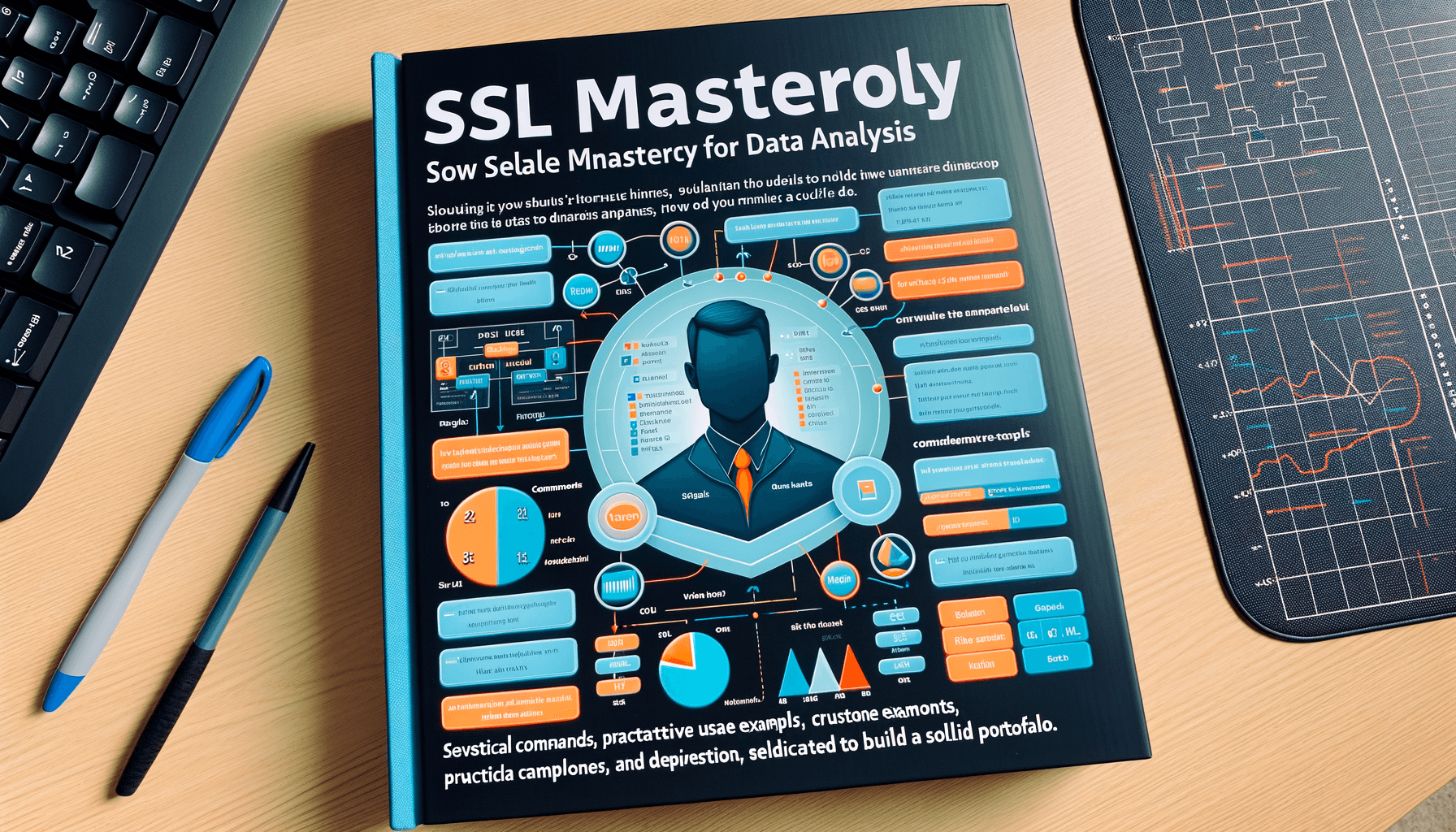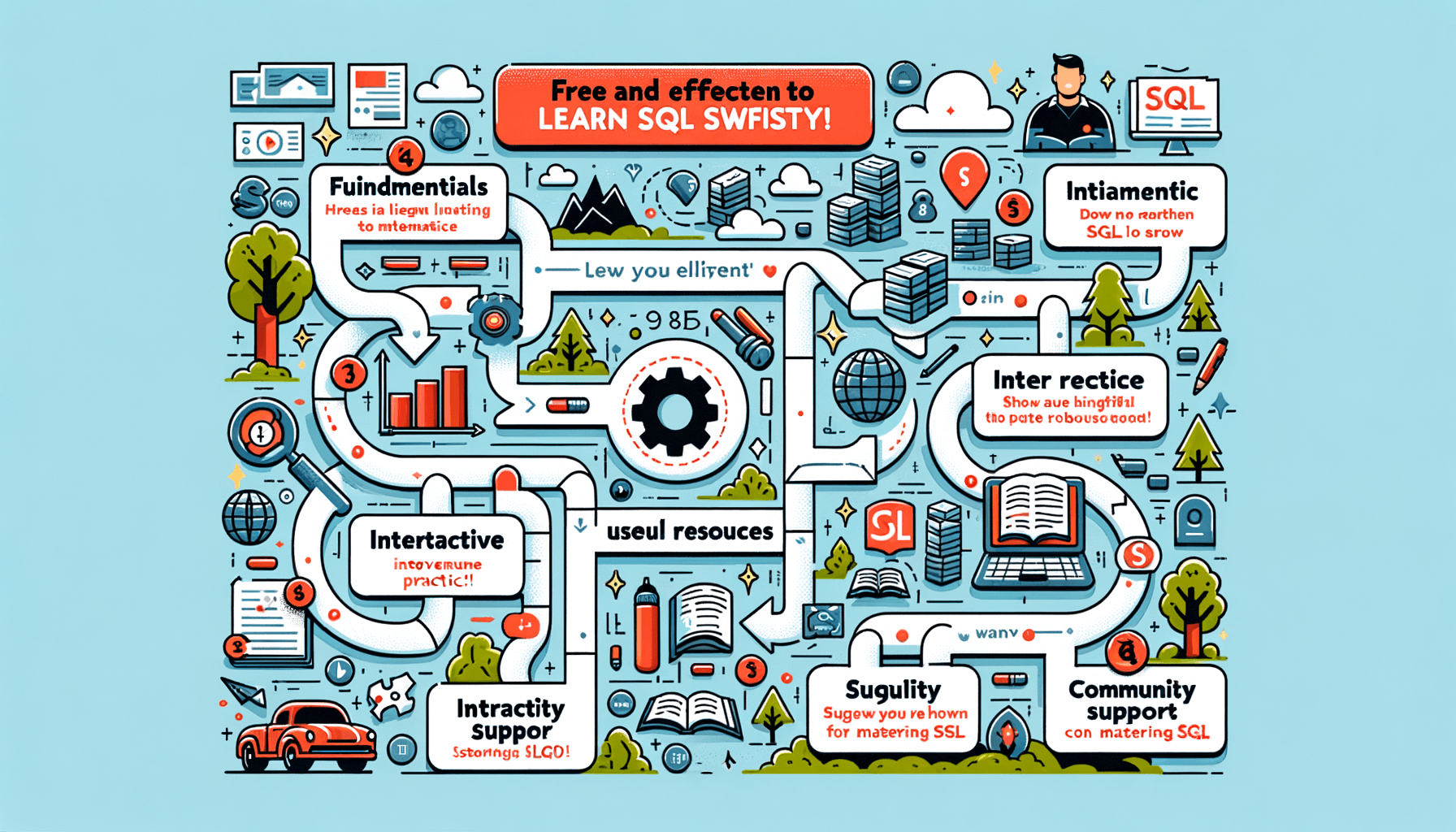A big variety of articles and resources

Master Your Skills: Learn SQL with Practice Exercises
 Sia Author and Instructor
Learn SQL
Sia Author and Instructor
Learn SQL
16 minute read
Getting Started with SQL
Setting Up Your SQL Environment
To jumpstart your SQL journey, setting up your SQL environment is the first crucial step. Ensure you have the necessary software installed, such as a database management system (DBMS) like MySQL or PostgreSQL. This setup will be your playground for all future SQL tasks.
Understanding Basic SQL Commands
Learning the basics of SQL begins with understanding commands like SELECT, INSERT, UPDATE, and DELETE. These commands allow you to interact with your database effectively and are foundational for any SQL learner.
Creating Your First Database
Creating your first database is a significant milestone. Start by defining the structure of your database with tables and relationships. Practice with simple exercises such as creating tables and inserting data to get comfortable with SQL operations.
Remember, the best way to learn SQL is to practice with real-world problems and hands-on projects.
Diving Deeper: Intermediate SQL Exercises
Mastering SQL Joins
Mastering SQL joins is crucial for handling complex queries involving multiple tables. By understanding different types of joins such as INNER, LEFT, RIGHT, and FULL, you can manipulate and retrieve data more effectively. Practice exercises often involve matching data from two or more tables to simulate real-world scenarios, enhancing your ability to analyze relational data.
Exploring GROUP BY Clauses
The GROUP BY clause is essential for aggregating data based on one or more columns. This feature is particularly useful in generating summarized information from large datasets. Exercises in this area will help you understand how to use GROUP BY in conjunction with aggregate functions like COUNT, SUM, and AVG to produce meaningful reports.
Utilizing Subqueries Effectively
Subqueries allow you to perform more dynamic and flexible SQL queries. They can be used in various parts of a query, including the SELECT, FROM, and WHERE clauses. Effective use of subqueries can significantly enhance the power of your SQL queries, making them more concise and efficient. Practice with subqueries often involves creating layered questions where the answer to one part depends on the results of another.
Advanced SQL Challenges
As you progress in your SQL journey, tackling advanced challenges is crucial for mastering the language. These exercises are designed to push your skills to new heights and prepare you for complex real-world data manipulation tasks.
Complex Query Writing
Writing complex SQL queries involves understanding deeper aspects of SQL syntax and logic. Mastering this allows you to handle large datasets and perform intricate data analysis, which is essential for business intelligence and data-driven decision-making.
Window Functions and Their Uses
Window functions are powerful tools in SQL that enable you to perform calculations across a set of table rows that are somehow related to the current row. This is particularly useful for running totals, averages, or rankings.
Common Table Expressions (CTEs)
CTEs provide a way to write more organized and readable SQL queries. They allow you to define a temporary result set which you can then reference within another SELECT, INSERT, UPDATE, or DELETE statement. This feature is especially beneficial in breaking down complex queries into simpler parts, making them easier to manage and understand.
Embrace these challenges to enhance your practical skills and gain a competitive edge in the field of data analysis.
Creating Real-World SQL Projects
Designing a Database for a Small Business
Starting with a practical approach, designing a database for a small business involves understanding the unique needs of the business and how data can be structured to support operations. Develop a schema that reflects the business's processes and ensures scalability and security.
Analyzing Data with SQL for Insights
Data analysis using SQL can transform raw data into actionable insights. Employ SQL queries to extract meaningful patterns and trends that can inform business decisions. This approach is crucial for driving strategic initiatives and understanding market dynamics.
SQL for E-commerce: A Case Study
Explore a case study where SQL is pivotal in managing e-commerce operations. From handling vast amounts of transaction data to customer analytics, SQL provides the backbone for e-commerce platforms to operate efficiently and effectively. Learn through real-world problem-solving how to optimize SQL queries for better performance.
Monthly SQL Practice Track
Keeping Skills Sharp with Regular Exercises
Continuous practice is the key to mastering SQL. Engage in our Monthly SQL Practice Track, which is regularly updated with fresh exercises. This ensures that your skills remain sharp and you stay up-to-date with the latest SQL developments.
Adapting to New SQL Features
Stay ahead of the curve by adapting to new SQL features as they emerge. Our practice track includes exercises that incorporate the latest SQL standards and practices, helping you to seamlessly integrate new techniques into your repertoire.
Engaging with a Community of Learners
Join a vibrant community of SQL learners who share your passion for data analysis. Participate in forums, share solutions, and gain insights from peers. This collaborative environment fosters a deeper understanding and a more enjoyable learning experience.
Resources and Tools for SQL Practice
Recommended Platforms for Practice
To effectively enhance your SQL skills, engaging with platforms that offer structured practice sets is crucial. Platforms like LearnSQL.com provide a comprehensive range of exercises from beginner to advanced levels, ensuring a well-rounded skill development.
Books and Online Courses
For those who prefer a more structured learning path, numerous books and online courses are available. The Data Analyst - Introduction to SQL course is particularly beneficial for beginners and includes interactive content like videos and real-world problem-solving exercises.
Setting Up a Personal SQL Lab
Creating your own SQL lab is an excellent way to practice. This involves setting up a database and experimenting with various queries and data sets. It's a hands-on approach that simulates real-world challenges, allowing for deeper understanding and skill enhancement.
Tips for Effective SQL Learning
Best Practices in SQL Coding
To enhance your SQL coding skills, always ensure your queries are both efficient and readable. Use consistent formatting and comment your code to make it understandable for others and your future self. Regularly review and refactor your code to maintain its efficiency as your database evolves.
How to Debug SQL Queries
Debugging SQL queries is crucial for maintaining data integrity and performance. Start by isolating the problematic part of your query. Use log outputs and temporary tables to understand the data flow and pinpoint issues. Remember, a methodical approach saves time and reduces frustration.
Leveraging SQL in Data Science
SQL is a powerful tool in data science for managing and querying large datasets. Familiarize yourself with SQL window functions and machine learning capabilities within SQL environments. Engage in projects that require complex data manipulation to build your skills in data-driven decision making.
Beyond SQL: Integrating Other Tools
Using SQL with Python
Integrating SQL with Python opens up a plethora of opportunities for automating and enhancing data manipulation tasks. Python's libraries such as Pandas and SQLAlchemy make it seamless to execute SQL queries and manage database connections. This integration is crucial for developing robust data analysis pipelines that are efficient and scalable.
Data Visualization Techniques
Effective data visualization is key to understanding complex data sets. By using SQL in conjunction with tools like Tableau or PowerBI, you can create dynamic visualizations that make trends and patterns in your data easily comprehensible. This skill is particularly valuable in areas such as business intelligence and data analytics, where visual data presentation is critical.
SQL in the Context of Big Data
The role of SQL extends significantly within the realm of big data. Technologies like Apache Hadoop and Spark integrate with SQL to process large volumes of data efficiently. Understanding how to leverage SQL in these environments enhances your ability to manage and analyze big data, making it an indispensable skill for data scientists and engineers.
Master Your Skills: Learn SQL with Practice Exercises
Embark on a journey to master SQL with a series of structured practice exercises designed to enhance your proficiency from basic to advanced levels. Whether you are a student, IT professional, or a curious learner, these exercises are tailored to improve your understanding and application of SQL in various real-world scenarios.
Engage with exercises that challenge you to think critically and solve problems effectively using SQL. This hands-on approach ensures that you not only learn SQL syntax but also how to apply it dynamically in different scenarios.
Start with simple queries and progressively tackle more complex SQL challenges. By the end of this track, you'll have a solid foundation in SQL and the confidence to handle any data manipulation task with ease.
Master Your Skills: Learn SQL with Practice Exercises
Mastering SQL is a journey of continuous learning and practice. To truly excel, engaging regularly with practice exercises is crucial. This section is dedicated to helping you navigate through various SQL challenges and projects that will enhance your understanding and skills.
Keeping Skills Sharp with Regular Exercises
Regular practice is key to mastering SQL. Set aside time each week to solve new problems and review old ones. This consistent effort will solidify your knowledge and keep your skills sharp.
Adapting to New SQL Features
SQL is an evolving language with new features and updates being introduced regularly. Stay informed about these changes and incorporate them into your practice routines to stay ahead.
Engaging with a Community of Learners
Join online forums, participate in SQL challenges, and connect with other learners. Sharing knowledge and experiences can provide new insights and make learning more enjoyable.
Recommended Platforms for Practice
Choose platforms that offer a wide range of exercises and real-time feedback. Some popular options include:
- SQLZoo
- LeetCode
- HackerRank
Books and Online Courses
Invest in books and courses that offer structured learning paths and practical exercises. They can provide a solid foundation and guide your practice sessions.
Setting Up a Personal SQL Lab
Create your own SQL environment where you can experiment and test different queries. This hands-on approach will help you learn faster and understand concepts more deeply.
Best Practices in SQL Coding
Adopt coding standards and best practices from the beginning. This will make your code more efficient, readable, and easier to debug.
How to Debug SQL Queries
Learn common debugging techniques and tools. Understanding how to quickly identify and fix errors in your SQL code is essential for effective problem-solving.
Leveraging SQL in Data Science
SQL is a powerful tool in data science for managing and analyzing large datasets. Enhance your data science skills by integrating SQL into your projects.
Using SQL with Python
Combine SQL with Python to perform more complex data manipulations and analyses. This integration can significantly expand your data handling capabilities.
Data Visualization Techniques
Master SQL data extraction techniques and use them to create impactful visualizations. This skill is highly valuable in presenting data insights clearly and effectively.
SQL in the Context of Big Data
Understand how SQL can be applied in big data scenarios. Learning to handle large volumes of data with SQL will prepare you for challenges in modern data environments.
Bold your commitment to regular practice and italicize your curiosity. These are your tools to becoming an SQL expert. Embrace them, and you will see significant progress in your skills and confidence.
Master Your Skills: Learn SQL with Practice Exercises
Embarking on the journey to master SQL through practice exercises is a strategic approach to enhance your data manipulation and analysis skills. Practice makes perfect, and with SQL, this is no exception. Engage in a variety of exercises ranging from basic commands to complex query writing to ensure a comprehensive understanding of SQL.
- Start with simple SELECT statements.
- Progress to more complex JOINs and GROUP BY clauses.
- Challenge yourself with advanced topics like Window Functions and CTEs.
Consistent practice will not only solidify your SQL skills but also increase your confidence in handling real-world data challenges.
By integrating regular practice into your learning routine, you'll be well on your way to becoming an SQL expert. Remember, the key to mastery is consistency in practice.
Master Your Skills: Learn SQL with Practice Exercises
Embark on a journey to master SQL with a series of structured practice exercises designed to enhance your proficiency from basic to advanced levels. Each section is tailored to progressively build your skills, ensuring a comprehensive understanding of SQL's powerful capabilities.
- Start with fundamental SQL commands and simple database operations.
- Advance through intermediate challenges involving joins, GROUP BY clauses, and subqueries.
- Tackle complex queries, window functions, and CTEs in the advanced section.
- Apply your skills in real-world projects across various domains like small businesses and e-commerce.
- Stay sharp with our Monthly SQL Practice Track, adapting to new features and engaging with a community.
- Utilize recommended resources and personal labs to practice effectively.
- Explore integration with other tools like Python and data visualization techniques for a well-rounded skillset.
Embrace continuous learning and practice to turn your SQL knowledge into a valuable professional asset. Success in mastering SQL is achieved through persistent effort and the right resources.
Master Your Skills: Learn SQL with Practice Exercises
Embarking on the journey to master SQL is a strategic move for anyone looking to excel in data manipulation and analysis. The path to proficiency involves a blend of theoretical knowledge and practical application. Engage in regular practice through structured exercises to solidify your understanding and adapt to evolving SQL features.
Embrace the challenge of monthly practice tracks and real-world projects to ensure continuous improvement and relevance in the field.
- Start with basic exercises to build a strong foundation.
- Progress to intermediate challenges that introduce more complex SQL commands and concepts.
- Tackle advanced problems that require sophisticated query techniques and deeper understanding.
- Apply your skills in real-world scenarios to gain practical experience and insights.
- Stay engaged with a community of learners to exchange knowledge and stay motivated.
Master Your Skills: Learn SQL with Practice Exercises
Embarking on the journey to master SQL is a strategic move for anyone looking to excel in data manipulation and analysis. This section is dedicated to providing you with a variety of practice exercises that will help you hone your skills from basic to advanced levels. Practice is key to mastering SQL, and here, you'll find exercises tailored to every stage of your learning.
- Getting Started: Begin with simple queries and gradually move to creating databases.
- Intermediate Challenges: Tackle joins, GROUP BY clauses, and subqueries.
- Advanced Scenarios: Dive into complex queries, window functions, and CTEs.
- Real-World Projects: Apply your skills in designing databases for businesses and e-commerce.
- Monthly Practice Track: Stay sharp with regular exercises that adapt to new SQL features.
- Resources and Tools: Utilize recommended platforms and books to enhance your learning.
- Beyond SQL: Integrate SQL with other tools like Python and data visualization techniques.
By consistently engaging with these exercises and utilizing the resources provided, you will build a robust understanding of SQL that can be applied in various real-world scenarios. This structured approach ensures that you not only learn SQL but also apply it effectively in your projects and daily tasks.
Master Your Skills: Learn SQL with Practice Exercises
Embarking on the journey to master SQL is a strategic move for anyone looking to enhance their data manipulation and analysis skills. This section is dedicated to providing you with a variety of practice exercises designed to refine and perfect your SQL abilities across different levels of complexity.
Getting Started with SQL
Start your SQL journey by setting up your own SQL environment, understanding the basic commands, and creating your first database. These initial steps are crucial for building a solid foundation in SQL.
Diving Deeper: Intermediate SQL Exercises
Progress to more challenging exercises that involve mastering SQL joins, exploring GROUP BY clauses, and utilizing subqueries effectively. This stage is designed to deepen your understanding and enhance your problem-solving skills in SQL.
Advanced SQL Challenges
Tackle complex query writing, learn about window functions and their uses, and explore Common Table Expressions (CTEs). These advanced topics will push your SQL skills to new heights and prepare you for real-world data challenges.
Creating Real-World SQL Projects
Apply your SQL knowledge to real-world projects such as designing a database for a small business, analyzing data for insights, and managing SQL for e-commerce. These projects simulate actual scenarios and require a comprehensive application of your SQL skills.
Monthly SQL Practice Track
Keep your SQL skills sharp with regular exercises and stay updated with the latest SQL features through our Monthly SQL Practice Track. Engaging with a community of learners will also enhance your learning experience and provide valuable feedback.
Resources and Tools for SQL Practice
Explore recommended platforms for practice, delve into books and online courses, and set up a personal SQL lab to further your learning and practice independently.
Tips for Effective SQL Learning
Adopt best practices in SQL coding, learn how to debug SQL queries, and leverage SQL in data science to maximize your learning outcomes and efficiency.
Beyond SQL: Integrating Other Tools
Expand your SQL knowledge by integrating it with other tools such as Python and data visualization techniques. Understanding SQL in the context of big data will also open up new opportunities and broaden your skillset.
Boldly embrace the challenges presented in these exercises and make the most of the resources provided to become proficient in SQL.
Conclusion
As we wrap up our journey through mastering SQL with practice exercises, it's clear that the path to proficiency is paved with consistent practice. Whether you're a beginner or looking to sharpen advanced skills, the exercises discussed provide a solid foundation for understanding and applying SQL concepts in real-world scenarios. Remember, the key to mastering SQL is not just understanding the syntax but also applying it to solve practical problems. Keep challenging yourself with new exercises, and soon, you'll find yourself navigating the world of data with confidence and expertise. Happy coding!
Frequently Asked Questions
How can I start learning SQL as a beginner?
Begin by understanding the basics of databases and SQL syntax. Set up a simple SQL environment and start practicing with basic queries like SELECT, INSERT, UPDATE, and DELETE. Online platforms and books can also provide structured learning paths.
What are some good resources for practicing SQL?
Online platforms like LearnSQL.com offer interactive exercises. Books and courses can also provide comprehensive guides and practice questions. Setting up your own database for hands-on practice is highly recommended.
How often should I practice SQL to become proficient?
Regular practice is key. Aim for daily or weekly sessions, depending on your schedule. Consistency will help you better understand and remember SQL commands and concepts.
Can I use SQL in data science?
Yes, SQL is fundamental in data science for data manipulation and analysis. Combining SQL with tools like Python and data visualization techniques can enhance your data science skills.
What are some advanced SQL topics I should learn?
After mastering basic commands and joins, move on to more complex topics like subqueries, window functions, common table expressions (CTEs), and dynamic SQL.
How can I integrate SQL with other programming languages?
SQL can be integrated with programming languages like Python using libraries such as SQLAlchemy or pandas for database interaction. This allows for more complex data analysis and manipulation within your applications.
Related Articles

10 Effective Tips on How to Learn SQL Online
9 minute read

A Comprehensive Guide to Learn SQL for Analysts
8 minute read


